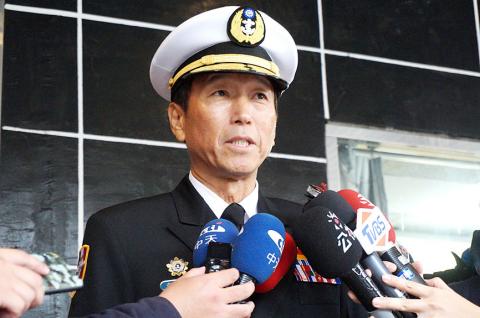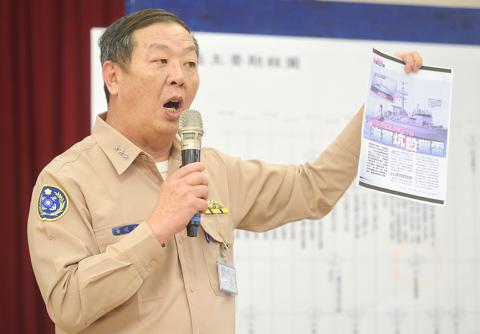The Ministry of National Defense (MND) yesterday censured a number of top navy officers, including Vice Minister of National Defense Admiral Pu Tze-chun (蒲澤春) and Chief of General Staff Admiral Lee Hsi-ming (李喜明), in connection with a minesweeper procurement scandal.
Disciplinary action was doled out for misconduct in contracting Ching Fu Shipbuilding Co (慶富造船) to build the vessels and a report on the minesweeper program presented by defense officials in the legislature last year, the ministry told a news conference.
A total of 24 officers were disciplined, it said.

Photo: Tu Chu-min, Taipei Times
A ministerial task force was called on Nov. 2 after an Executive Yuan investigative report found fault with the military’s handling of the contract with Ching Fu to build six minesweepers, the ministry said.
The probe found flaws in the military’s pre-bidding preparations, the contract, the process for awarding the bid and supervision of the contractor’s compliance with its obligations, it said.
Eighteen admirals and captains were disciplined for their role in the procurement, including Pu, who received a demerit.

Photo: Chang Chia-ming, Taipei Times
Lee and Navy Commander Rear Admiral Huang Shu-kuang (黃曙光), and former deputy minister of national defense Admiral Chen Yung-kang (陳永康) each received two warnings.
Vice Admiral Huang Hsi-ju (黃希儒), procurement division chief of the ministry’s Armaments Bureau, received a demerit.
Nine navy admirals and captains were censured for misinforming lawmakers on the progress that Ching Fu was making on the minesweeper program during a budget report on Nov. 17 last year, the ministry said.
The officers presented a report that was inaccurate, the ministry said, adding that the incident reflected organizational failures on multiple levels of the ministry.
Four of the nine censured for making inaccurate reports to the legislature were also involved in the minesweepers’ procurement.
Armaments Bureau Director-General Vice Admiral Mei Chia-shu (梅家樹) received one demerit and three warnings for his conduct in the procurement process and the budget report.
The officers the ministry censured are currently serving or had served at influential ministerial posts, as well as Navy Command Headquarters and the navy’s Planning Division.
The ministry’s internal investigation is ongoing and it has informed prosecutors of its findings, which might result in criminal proceedings, it said.
President Tsai Ing-wen (蔡英文) vowed to thoroughly investigate the minesweeper scandal, address the government’s shortcomings and forge ahead with the domestic warship program.
“We will find out the truth and uphold the highest standards of accountability. This program that was initiated by previous administration is clearly flawed. The program must be subjected to strict scrutiny, from decisionmaking to bidding, syndicated loans and contract supervision,” she said in a statement.
“Each and every relevant agency must fully cooperate with the investigation... Any individual who is guilty of corruption will receive no leniency, regardless of who they are or what rank they hold,” she said.
The government will keep its focus on problem-solving and correct errors regardless of when they first occurred, she said, adding that the nation needs a more effective procurement system that excludes unsuitable contractors.
Her administration will continue its policy to develop a domestic shipbuilding program, Tsai said.
“It is my hope that this error and failure will be a lesson for our armed forces to find the right path forward,” she said.
“The government’s resolve to be self-sufficient in national defense is unshakable. We will not allow an isolated incident to affect our determination to have navy ships built domestically,” she said.

AGING: As of last month, people aged 65 or older accounted for 20.06 percent of the total population and the number of couples who got married fell by 18,685 from 2024 Taiwan has surpassed South Korea as the country least willing to have children, with an annual crude birthrate of 4.62 per 1,000 people, Ministry of the Interior data showed yesterday. The nation was previously ranked the second-lowest country in terms of total fertility rate, or the average number of children a woman has in her lifetime. However, South Korea’s fertility rate began to recover from 2023, with total fertility rate rising from 0.72 and estimated to reach 0.82 to 0.85 by last year, and the crude birthrate projected at 6.7 per 1,000 people. Japan’s crude birthrate was projected to fall below six,

US President Donald Trump in an interview with the New York Times published on Thursday said that “it’s up to” Chinese President Xi Jinping (習近平) what China does on Taiwan, but that he would be “very unhappy” with a change in the “status quo.” “He [Xi] considers it to be a part of China, and that’s up to him what he’s going to be doing, but I’ve expressed to him that I would be very unhappy if he did that, and I don’t think he’ll do that. I hope he doesn’t do that,” Trump said. Trump made the comments in the context

SELF-DEFENSE: Tokyo has accelerated its spending goal and its defense minister said the nation needs to discuss whether it should develop nuclear-powered submarines China is ramping up objections to what it sees as Japan’s desire to acquire nuclear weapons, despite Tokyo’s longstanding renunciation of such arms, deepening another fissure in the two neighbors’ increasingly tense ties. In what appears to be a concerted effort, China’s foreign and defense ministries issued statements on Thursday condemning alleged remilitarism efforts by Tokyo. The remarks came as two of the country’s top think tanks jointly issued a 29-page report framing actions by “right-wing forces” in Japan as posing a “serious threat” to world peace. While that report did not define “right-wing forces,” the Chinese Ministry of Foreign Affairs was

PREPAREDNESS: Given the difficulty of importing ammunition during wartime, the Ministry of National Defense said it would prioritize ‘coproduction’ partnerships A newly formed unit of the Marine Corps tasked with land-based security operations has recently replaced its aging, domestically produced rifles with more advanced, US-made M4A1 rifles, a source said yesterday. The unnamed source familiar with the matter said the First Security Battalion of the Marine Corps’ Air Defense and Base Guard Group has replaced its older T65K2 rifles, which have been in service since the late 1980s, with the newly received M4A1s. The source did not say exactly when the upgrade took place or how many M4A1s were issued to the battalion. The confirmation came after Chinese-language media reported